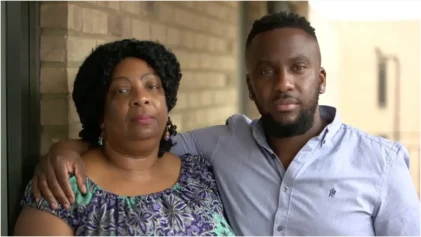A Brazilian maid who reportedly spent nearly 40 years in servitude was finally rescued from her captors late last month.
The woman, now 46, was just 8 years old when her destitute mother handed her over to Dalton Cesar Milagres Rigueira, a professor at Patos de Minas University, otherwise known as UNIPAM, authorities say.
Rigueira’s mother raised the young child, and she’s spent the past 38 years working for the family without pay or any time off. She was relegated to a life of cleaning and even forced into marriage.
Brazilian news site Fantastico broke the news on Dec. 20 and identified the woman as Madelena Gordiano. According to the reports, she is a Black woman. During her captivity, Gordiano was granted limited freedoms and remained under constant watch by the family.
“They gave her food when she was hungry, but all other rights were taken from her,” Humberto Camasmie, the anti-slavery inspector who led the mission to rescue the enslaved woman, told the Thomson Reuters Foundation.
Authorities moved Gordiano into a shelter and she’s being treated by psychologists and social workers, Reuters reported.
Gordiano allegedly was forced to marry an elderly relative of the family so they could continue to collect his pension payments after he died.
Brazil’s Labor Prosecutor’s Office investigated the case, and the Public Ministry of Labor rescued her Nov. 27 with help from the Federal Police, according to Brazilian TV Station G1 Triângulo e Alto Paranaíba. MPT inspectors found her living inside a small windowless room in an apartment in the heart of Patos de Minas, a municipality in the Brazilian state Minas Gerais.
“It was a room less than 3 meters long by 2 meters wide, stuffy and without ventilation,” Camasmie said.
More than 100 demonstrators took to the streets of Patos de Minas on Dec. 21 to protest Gordiano’s years of ill treatment. The protestors marched in front of UNIPAM and denounced Rigueira.
Élida Abreu, a member of the organization that coordinated the rally, told G1 called the situation shocking and said it signaled the longstanding tradition of Brazil’s racial divide.
“Brazil was the last country in the Americas to abolish slavery, so we still live with the remnants of that period of slavery,” Abreu said. “Black people in Brazil are still subjected to inequality, segregation, violence ”, he added.
Camasmie said residents in the apartment complex reported suspicious activity after Gordiano began slipping notes under her neighbors’ doors asking her for money to buy personal hygiene items.
According to Fantastico’s report, Gordiano married an uncle of Rigueira’s wife. She never lived with the man. But when he died shortly after their nuptials, he left behind two pensions totaling about $1,560 each month. But Gordiano’s employer controlled her bank accounts and the woman never received any of the pension funds.
Reuters said Gordiano is now keeping her late husband’s pension and authorities are working to reunite her with her biological family.
Fantastico reports that about 55,000 people have been rescued from slavery in Brazil over the past 25 years. In 2019, 14 people were freed from domestic slave labor, a harder thing to detect because many of those victims don’t even realize they’re living in servitude.
A UNIPAM spokesman told Reuters that the university suspended Rigueira, saying “all legal measures are being taken.”
The professor and family members are now being investigated for criminal offenses tied to subjecting Gordiano to what many news reports described as slave-like conditions. If convicted, Rigueira and company could face as many as 20 years in prison, according to G1.
Brian Epstein Campos, an attorney representing the professor’s family, released a statement decrying the negative media coverage of his clients. The G1 story included the full text of his statement:
“With respect to all possible and valid interpretations and the right of demonstration in a democracy, the defense informs that it has not yet had access to all the elements that involve Madalena,” the statement read. “The premature and irresponsible disclosure, by state inspectors and agents, before of a process that by sentence recognizes guilt, violates the rights and sensitive data of that family and violates their personal security. The defense will continue, discreet and serious, acting exclusively within the constitutional limits and due process. And careful reflection, after knowing all the facts will never create harm.”


